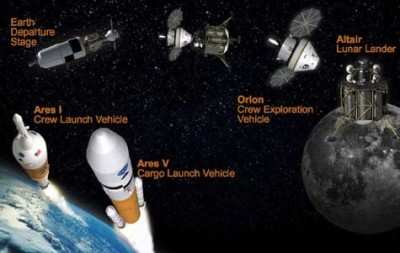Thu, May 27, 2010
CAGW Says It Represents "Old NASA"
 President George W. Bush initiated the Constellation program
with the goal of putting man back on the moon by 2020. The stated
goals were to gain significant experience in operating away from
Earth's environment, developing new technologies required for
exploring the solar system and conducting fundamental science. But
Citizens Against Government Waste (CAGW) says in a report released
Wednesday that the program is the latest in a series of troubled
post-Apollo human spaceflight programs within the U.S. space
agency, plagued by slipping deadlines and ballooning costs.
President George W. Bush initiated the Constellation program
with the goal of putting man back on the moon by 2020. The stated
goals were to gain significant experience in operating away from
Earth's environment, developing new technologies required for
exploring the solar system and conducting fundamental science. But
Citizens Against Government Waste (CAGW) says in a report released
Wednesday that the program is the latest in a series of troubled
post-Apollo human spaceflight programs within the U.S. space
agency, plagued by slipping deadlines and ballooning costs.
“As romantic and inspirational as space flight is, the
brutal reality is that the Constellation program has become a
symbol of the ‘old NASA,’” said CAGW President
Tom Schatz. “The program is morphing into another
ill-conceived government program suffering from all too familiar
runaway costs. The nation cannot continue to sink unlimited dollars
into this black hole.”
In 2006, the Government Accountability Office (GAO) estimated
that the total budget required for implementing the Constellation
Program (through initial lunar missions) was nearly $230 billion.
In 2009, the GAO concluded that “while the agency has already
obligated more than $10 billion in contracts, at this point NASA
does not know how much Ares I and Orion will ultimately cost, and
will not know until technical and design challenges have been
addressed.”

Constellation’s weaknesses have been extensively
documented by the Congressional Budget Office (CBO), the GAO, and
the Review of Human Spaceflight Plans Committee led by former
aerospace executive Norm Augustine. The CBO warned in April, 2009
that “if NASA’s funding was increased to about $21.1
billion annually, the agency would be able to meet its planned
schedules for the Constellation program even if cost growth was
consistent with the average for past programs. But that amount of
funding would not permit NASA to fly the space shuttle beyond 2010
or to support the space station beyond 2015. Moreover, under this
budgetary scenario, 15 of the planned science missions would be
delayed past 2025.”
Efforts to terminate this enormously wasteful and ineffective
program have encountered the usual congressional interference. Sen.
Richard Shelby (R-Ala.) has attached a congressional earmark for
Constellation to an emergency war funding bill that must pass
Congress this year.

“President Obama has taken a step in the right direction
by proposing to cancel the unsustainable Constellation Program in
favor of looking to increased reliance on the private sector and
investment in technologies that can lower the cost of human space
exploration,” concluded Schatz. “Congress should not
interfere with this objective.”
More News
Aero Linx: International Federation of Airworthiness (IFA) We aim to be the most internationally respected independent authority on the subject of Airworthiness. IFA uniquely combi>[...]
Ultrahigh Frequency (UHF) The frequency band between 300 and 3,000 MHz. The bank of radio frequencies used for military air/ground voice communications. In some instances this may >[...]
A Few Questions AND Answers To Help You Get MORE Out of ANN! 1) I forgot my password. How do I find it? 1) Easy... click here and give us your e-mail address--we'll send it to you >[...]
From 2019 (YouTube Edition): Learning To Paint Without Getting Any On Your Hands PPG's Aerospace Coatings Academy is a tool designed to teach everything one needs to know about all>[...]
Also: Sustainable Aircraft Test Put Aside, More Falcon 9 Ops, Wyoming ANG Rescue, Oreo Cookie Into Orbit Joby Aviation has reason to celebrate, recently completing its first full t>[...]
 ANN's Daily Aero-Linx (05.06.25)
ANN's Daily Aero-Linx (05.06.25) ANN's Daily Aero-Term (05.06.25): Ultrahigh Frequency (UHF)
ANN's Daily Aero-Term (05.06.25): Ultrahigh Frequency (UHF) ANN FAQ: Q&A 101
ANN FAQ: Q&A 101 Classic Aero-TV: Virtual Reality Painting--PPG Leverages Technology for Training
Classic Aero-TV: Virtual Reality Painting--PPG Leverages Technology for Training Airborne 05.02.25: Joby Crewed Milestone, Diamond Club, Canadian Pilot Insurance
Airborne 05.02.25: Joby Crewed Milestone, Diamond Club, Canadian Pilot Insurance





